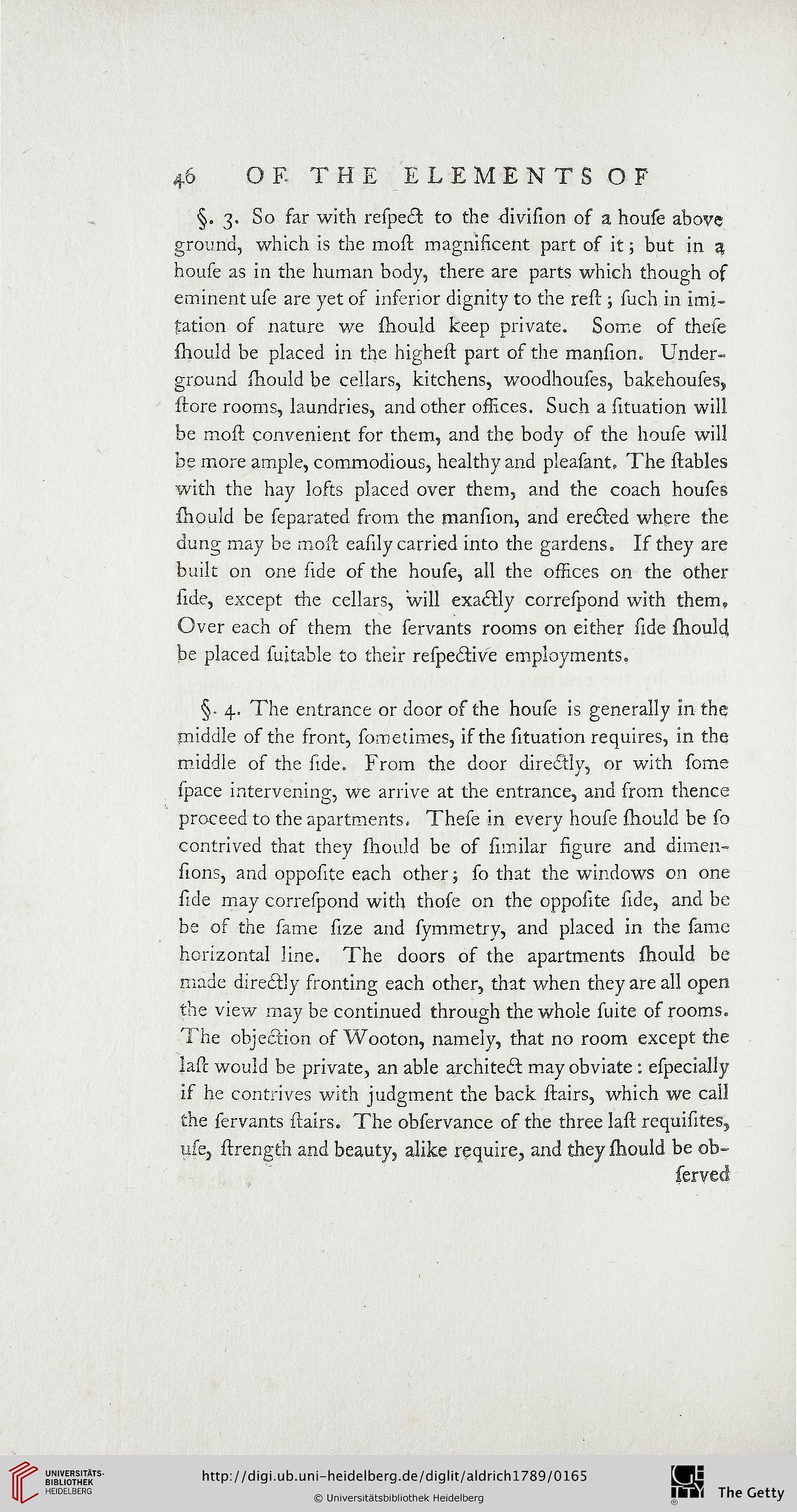46 OF- THE ELEMENTS OF
§. 3. So far with respefit to the division of a house above
ground, which is the most magnisicent part of it; but in a
house as in the human body, there are parts which though os
eminent use are yet os inferior dignity to the rest ; such in imi-
tation os nature we stiould keep private. Some of these
should be placed in the highest part of the mansiom Under-
ground should be cellars, kitchens, woodhouses, bakehouses,
store rooms, laundries, and other ossices. Such a situation will
be most convenient for them, and the body of the house will
be more ample, commodious, healthy and pleasant. The stables
with the hay lofts placed over them, and the coach houses
should be separated from the mansion, and erected where the
dung may be most easily carried into the gardens. If they are
built on one side of the house, all the offices on the other
side, except the cellars, will exasilly correspond with them.
Over each of them the servants rooms on either side should
be placed suitable to their respefitive employments.
§. 4. The entrance or door of the house is generally in the
middle of the front, sometimes, if the situation requires, in the
middle os the side. From the door direfitly, or with some
space intervening, we arrive at the entrance, and srom thence
proceed to the apartments. These in every house should be so
contrived that they should be of similar figure and dimen-
sions, and opposite each other; so that the windows on one
side may correspond with those on the opposite side, and be
be of the same size and symmetry, and placed in the same
horizontal line. The doors of the apartments should be
made direfilly fronting each other, that when they are all open
the view may be continued through the whole suite of rooms.
The objection of Wooton, namely, that no room except the
last would be private, an able architect may obviate : especially
if he contrives with judgment the back slairs, which we call
the servants slairs. The observance of the three last requisites,
use, strength and beauty, alike require, and they should be ob-
served
§. 3. So far with respefit to the division of a house above
ground, which is the most magnisicent part of it; but in a
house as in the human body, there are parts which though os
eminent use are yet os inferior dignity to the rest ; such in imi-
tation os nature we stiould keep private. Some of these
should be placed in the highest part of the mansiom Under-
ground should be cellars, kitchens, woodhouses, bakehouses,
store rooms, laundries, and other ossices. Such a situation will
be most convenient for them, and the body of the house will
be more ample, commodious, healthy and pleasant. The stables
with the hay lofts placed over them, and the coach houses
should be separated from the mansion, and erected where the
dung may be most easily carried into the gardens. If they are
built on one side of the house, all the offices on the other
side, except the cellars, will exasilly correspond with them.
Over each of them the servants rooms on either side should
be placed suitable to their respefitive employments.
§. 4. The entrance or door of the house is generally in the
middle of the front, sometimes, if the situation requires, in the
middle os the side. From the door direfitly, or with some
space intervening, we arrive at the entrance, and srom thence
proceed to the apartments. These in every house should be so
contrived that they should be of similar figure and dimen-
sions, and opposite each other; so that the windows on one
side may correspond with those on the opposite side, and be
be of the same size and symmetry, and placed in the same
horizontal line. The doors of the apartments should be
made direfilly fronting each other, that when they are all open
the view may be continued through the whole suite of rooms.
The objection of Wooton, namely, that no room except the
last would be private, an able architect may obviate : especially
if he contrives with judgment the back slairs, which we call
the servants slairs. The observance of the three last requisites,
use, strength and beauty, alike require, and they should be ob-
served





